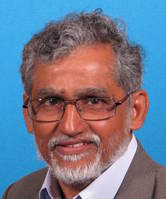Research Area(s)
- Particle Physics Theory and Phenomenology
About Me
Research and Academic Interests
Dr. Rangacharyulu's main research interests: Nuclear and Elementary Particle Physics, Quantum Chaos, Conceptual Foundations of Physics and Physics Education.
Nuclear and Elementary Particle Physics: The main interests in this research are unraveling structure and symmetry informations in the sub-atomic world. This work is carried out in collaboration with research groups in Darmstadt (Germany), National High energy Physics Laboratory(KEK), Tsukuba (Japan) and Osaka University, Osaka, Japan. The research is hardware and software intensive and the main activities involve developments of radiation detector assemblies and the ancillary electronic arrangements to accomplish the physics goals. The main experimental facilities are the following: a) the three spectrometer system of the A1 collaboration at the 855 MeV electron accelerator (MAMI) at Mainz, Germany; b) 130 MeV superconducting electron accelerator (S-DALINAC) at Darmstadt; and c) 12-sector superconducting toroidal spectrometer at the 12GeV Proton Synchrotron at KEK. At Mainz, we experiment to examine the role of isobar components in the nuclear ground states. At KEK, we are carrying out a high-precision test of the validity of time reversal symmetry. We employ secondary beams of K+ mesons for this purpose. Our group will be heavily involved in the developments of equipment for the polarized tagged photon beams of 1-3.5 GeV at the 8-GeV Super Photon ring (SPring-8) in Japan.
Quantum Chaos: Unlike the case of classical chaos, the signatures of onset of Quantum chaos are subjects of much discussion. Even the choice of appropriate observables and the correspondence to the classical chaos is unclear. We investigate this phenomenon in macroscopic and microscopic system. We examine the signatures for quantum chaos in phenomena such as channeling radiation, nuclear level systematics and transition strengths and also in the modes of excitation of superconducting microwave cavities. This work is carried out in collaboration with nicht-linieaire dynamik groups in Darmstadt.
Conceptual Foundations of Physics and Physics Education:: Contrary to popular belief, the basic concepts of physics lack clarity and become very fuzzy at the fundamental level. It is likely that the reductionism principle fails to provide a satisfactory, coherent description of physics phenomena. The foundational bases and limits of validity of concepts of particle-wave duality, space-time and constituents of matter and interactions are investigated. The implications of these aspects to the physics education are of considerable interest.


